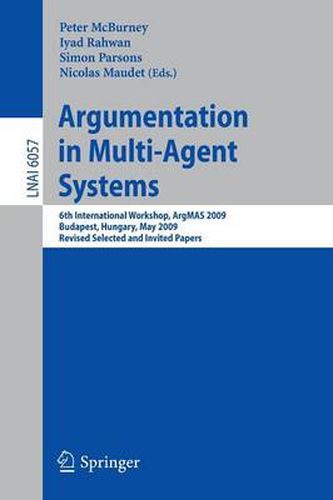Readings Newsletter
Become a Readings Member to make your shopping experience even easier.
Sign in or sign up for free!
You’re not far away from qualifying for FREE standard shipping within Australia
You’ve qualified for FREE standard shipping within Australia
The cart is loading…






This title is printed to order. This book may have been self-published. If so, we cannot guarantee the quality of the content. In the main most books will have gone through the editing process however some may not. We therefore suggest that you be aware of this before ordering this book. If in doubt check either the author or publisher’s details as we are unable to accept any returns unless they are faulty. Please contact us if you have any questions.
This volume contains revised versions of the papers presented at the sixth e- tion of the International Workshop on Argumentation in Multi-Agent Systems, (ArgMAS2009),heldinBudapest,Hungary,inassociationwiththe8thInter- tional Conference on Autonomous Agents and Multi-Agent Systems (AAMAS 2009) in May 2009. Previous ArgMAS workshops have been held in New York City, USA (2004),Utrecht, The Netherlands (2005),Hakodate, Japan (2006), Honolulu, USA (2007) and Estoril, Portugal (2008). The event has now clearlyestablisheditselfonthe internationalcalendaramongresearchersinc- putational argument and dialectics. A brief word to explain these topics is in order. Di?erent agents within a multi-agent system (MAS) potentially have di?erential access to information and di?erent capabilities, di?erent beliefs, di?erent preferences and desires, and di?erent goals. A key aspect of the scienti?c and engineering study of mul- agentsystemsthereforehasbeenthedevelopmentofmethodsandproceduresfor identifying, assessing, reconciling, arbitrating between, managing, and mitig- ing suchdi?erences. Marketmechanismsandvotingproceduresaretwo methods fordealing with thesedi?erences. Argumentationisanother. Argumentationcan be understood as the formal interaction of di?erent arguments for and against some conclusion (e. g. , a proposition, an action intention, a preference, etc. ). An agent may use argumentation techniques to perform individual reasoning for itself alone, in order to resolve con?icting evidence or to decide between c- ?icting goals it may have. Two or more agents may also jointly use dialectical argumentationto identify, express,andreconciledi?erencesbetweenthemselves, by means of interactions such as negotiation, persuasion, inquiry, and joint - liberation.
$9.00 standard shipping within Australia
FREE standard shipping within Australia for orders over $100.00
Express & International shipping calculated at checkout
This title is printed to order. This book may have been self-published. If so, we cannot guarantee the quality of the content. In the main most books will have gone through the editing process however some may not. We therefore suggest that you be aware of this before ordering this book. If in doubt check either the author or publisher’s details as we are unable to accept any returns unless they are faulty. Please contact us if you have any questions.
This volume contains revised versions of the papers presented at the sixth e- tion of the International Workshop on Argumentation in Multi-Agent Systems, (ArgMAS2009),heldinBudapest,Hungary,inassociationwiththe8thInter- tional Conference on Autonomous Agents and Multi-Agent Systems (AAMAS 2009) in May 2009. Previous ArgMAS workshops have been held in New York City, USA (2004),Utrecht, The Netherlands (2005),Hakodate, Japan (2006), Honolulu, USA (2007) and Estoril, Portugal (2008). The event has now clearlyestablisheditselfonthe internationalcalendaramongresearchersinc- putational argument and dialectics. A brief word to explain these topics is in order. Di?erent agents within a multi-agent system (MAS) potentially have di?erential access to information and di?erent capabilities, di?erent beliefs, di?erent preferences and desires, and di?erent goals. A key aspect of the scienti?c and engineering study of mul- agentsystemsthereforehasbeenthedevelopmentofmethodsandproceduresfor identifying, assessing, reconciling, arbitrating between, managing, and mitig- ing suchdi?erences. Marketmechanismsandvotingproceduresaretwo methods fordealing with thesedi?erences. Argumentationisanother. Argumentationcan be understood as the formal interaction of di?erent arguments for and against some conclusion (e. g. , a proposition, an action intention, a preference, etc. ). An agent may use argumentation techniques to perform individual reasoning for itself alone, in order to resolve con?icting evidence or to decide between c- ?icting goals it may have. Two or more agents may also jointly use dialectical argumentationto identify, express,andreconciledi?erencesbetweenthemselves, by means of interactions such as negotiation, persuasion, inquiry, and joint - liberation.